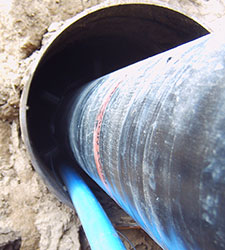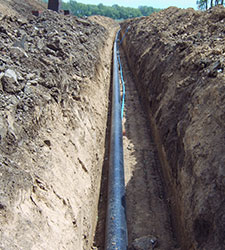 TraceTek can be more effective than SCADA at detecting oil leaks
TraceTek can be more effective than SCADA at detecting oil leaks
CASE STUDY: Pipelines traversing beaches on Mayotte Island, Tanzania and on the coast of Chile
THE RISK
At small oil ports around the world, tankers often unload their cargo of crude oil or refined fuels into small pipe systems that traverse ecologically sensitive beach and dune zones. Where operation is intermittent and pipeline lengths relatively short, traditional SCADA-based leak detection systems which rely on predictable constant flow rates are rendered ineffective. In fact even large leaks during off-loading may go completely undetected, compromising operators environmental responsibility and devastating the local ecology.
THE SOLUTION
 Tyco Thermal Controls is able to offer companies facing this risk with a better solution using TraceTek TT5000 – one of the only effective leak detection systems for such critically environmentally sensitive areas. The TraceTek TT5000 pipeline monitoring system uses specialist hydrocarbon leak detection cable buried inside slotted conduit in the same trench as the pipework. Once installed, with as many individual 1 km circuits as necessary, the system can monitor the entire pipeline and detect and pinpoint the location of a leak to +/- 1 metre. Each circuit has its own Sensor Interface Module (SIM) and up to 128 SIMs can be networked back to the alarm and user interface panel.
Tyco Thermal Controls is able to offer companies facing this risk with a better solution using TraceTek TT5000 – one of the only effective leak detection systems for such critically environmentally sensitive areas. The TraceTek TT5000 pipeline monitoring system uses specialist hydrocarbon leak detection cable buried inside slotted conduit in the same trench as the pipework. Once installed, with as many individual 1 km circuits as necessary, the system can monitor the entire pipeline and detect and pinpoint the location of a leak to +/- 1 metre. Each circuit has its own Sensor Interface Module (SIM) and up to 128 SIMs can be networked back to the alarm and user interface panel.
THE APPLICATION
Short pipeline systems, on Mayotte Island, Tanzania and on the coast of Chile are just two of the locations with beach and dune zones where operators with environmental concerns have employed TT5000 fuel sensor cables as their primary leak detection system. In both cases they have been installed along with the single wall steel pipes to provide a long-term monitoring and leak alert capability.


